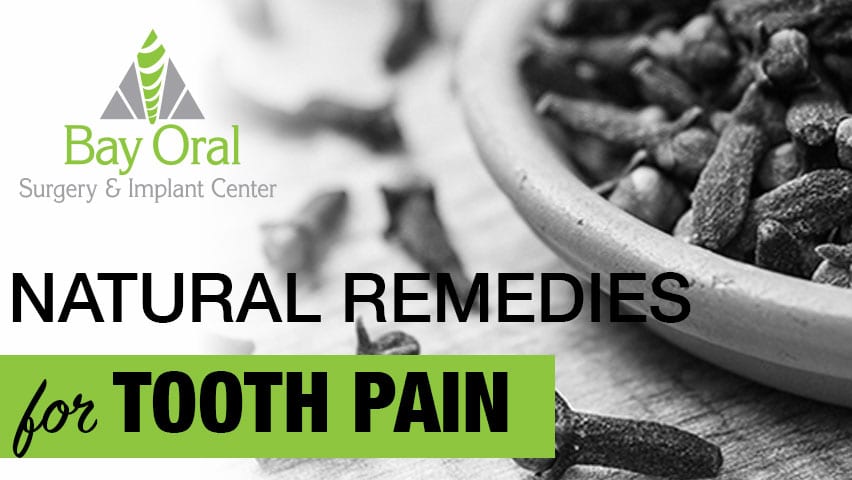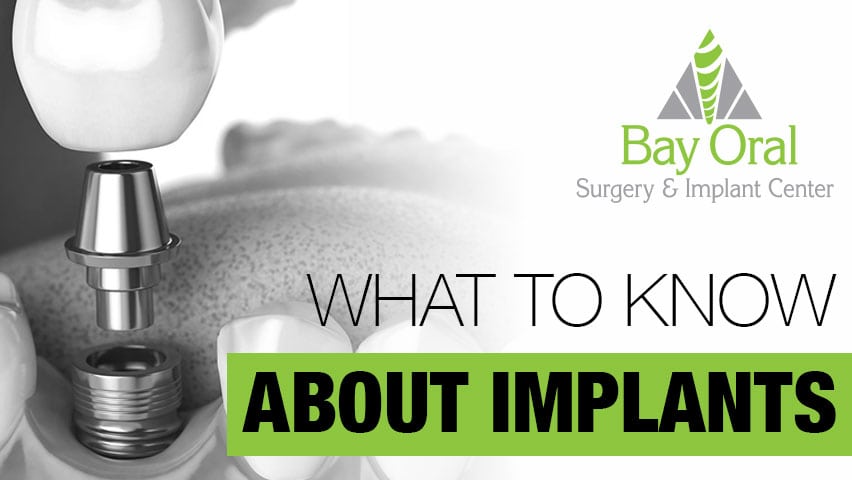
by Bay Oral Surgery | Jan 14, 2019 | Blog
Here at Bay Oral, we recognize that many of our patients don’t necessarily love going to the dentist so the thought of having oral surgery can be scary. That uncertainty is normal however, we would like to dispel some of those fears and answer the most common questions patients ask when considering oral surgery.
How do I know if I need oral surgery?
Oral and Maxillofacial surgeons are specially trained in surgery on gums, teeth, jaw, face and head. Most commonly your dentist will make a recommendation for you to see one of our surgeons to ensure you have the best care possible, whether you need your wisdom teeth removed or are dealing with tooth loss or facial trauma. If you think you are in need of oral surgery, schedule an appointment for a consultation today.
How long is oral surgery?
The length of the surgery depends on the type and the extent of the procedure.
Wisdom tooth removal typically last between 30 – 90 minutes.
The dental implant process can vary widely dependent on whether you need bone grafting to prepare the jaw and how long it takes for the artificial root to bond and heal with your natural jaw bone.
How long is recovery?
Recovery from dental surgery really depends on the patient and the type of surgery they are undergoing. Bleeding is normal after a tooth extraction and will usually stop within 24 hours. You can expect swelling to be completely gone within 7-10 days. We recommend that you rest for at least two days after an oral surgery to allow your body to heal and reduce the risk of dry socket. For more recovery information see our post operative instructions.
Are there foods that I need to avoid after the surgery?
Softer foods are easier to eat post-surgery (ex. jello, pudding, applesauce, ice cream, yogurt, cottage cheese, mashed potatoes, noodles, etc). Some procedures will require a no-chew diet, you will be been given instructions by your Doctor if this is the case.
Is it alright to eat before the scheduled surgery?
In general we ask all patients to abstain from eating for at least 6 hours before their appointment. This is especially important if you are undergoing general anesthesia or IV sedation. Find out more about dental surgery preparation, here.
Will I need to be under anesthesia for oral surgery?
All of our procedures at Bay Oral are surgical in nature and will require some type of anesthesia – check out our post “Dental Anesthesia / Sedation and You” to learn more.
Why did my dentist send me to an oral surgeon just to remove a tooth? Can’t he do that?
General dentists can and sometimes do perform tooth extractions, however depending on the type of impaction or if the procedure requires a surgical approach, oral surgeons are the most qualified to perform this procedure. We not only specialize in this procedure and remove thousands of teeth every year, we also provide sedation so our patients have an easier, safer and more comfortable experience.
What are dental implants?
Dental Implants are titanium posts surgically placed into the jaw bone, beneath the gums, creating a stable foundation to attach a prosthetic tooth. The implant replaces the missing root from a lost or extracted tooth.
What are some of the benefits of dental implants?
Dental Implants help preserve facial structure, preventing bone deterioration that occurs when teeth are missing. Dental implants provide a foundation for replacement teeth that look, feel, and function like natural teeth. When you choose dental implants, you regain the ability to eat your favorite foods, and smile with confidence knowing that your teeth appear natural and healthy.
Is the implant procedure painful?
Most people will attest that the dental implant procedure produces minimal discomfort due to the use of anesthetics. Patients often indicate that implants are less painful than extractions.
How long do implants last?
Dental implants commonly last longer than other methods of replacing teeth like bridges and dentures, however, the longevity of dental implants depends on a number of things; how well you take care of them, how much you avoid biting and chewing on hard objects or opening things with your teeth, and your overall health. In general, more than 90% of implants will still be functional after 10 years.
What is involved with taking care of dental implants?
Although an implant cannot decay like a natural tooth it is just as important to keep it clean and to remove the harmful bacteria buildup that can cause infection (implantitis) around the implant. Continue your regular dental cleanings for the best and most long-lasting success.

by Bay Oral Surgery | Dec 15, 2018 | Blog, Implants

Dental and oral traumas are relatively common occurrences. The most common causes are physical injury due to a fall, sports related injury, and motor vehicle accident.
For a pediatric (child) patient, falls are common when first learning how to walk. Most coffee tables happen to be about the height of a child of that age, making it a common point of contact. This can cause injury to either the soft tissue, such as the lip, gingiva (gum) and tongue, or the hard tissue, such as the bone or teeth.
Dental and oral injuries differ in their severity and their management. Therefore, a professional evaluation is needed. The dentist is usually the first point of contact to proper management of these injuries. Generally speaking, when a dentist feels that the extent of injury requires a higher level of intervention, the patient is referred to an Oral and Maxillofacial Surgeon for definitive treatment.
Important things to know about dental and oral injury:
1. If there is bleeding, applying pressure to the bleeding area will help to slow and stop the bleeding. Pressure can be applied using sterile gauze, which are usually available commercially at the pharmacy.
2. Timing of injury is important. The sooner the patient seeks care, the less blood loss and the better the outcome of the intervention will be.
Management of a tooth:
- If a tooth is injured and has some mobility (loose tooth), do not attempt to remove it. A tooth’s natural environment is the oral cavity. However, the patient needs to be very careful as having a loose tooth can make it a risk for swallowing it by the patient.
- If the tooth is dislodged out of the mouth, attempt to find the tooth. The tooth should be kept in the appropriate environment to be able to rescue it. There are many commercially available products to place a tooth in if it gets dislodged, such as Save – A – Tooth preserving system. If no solution is present, keeping a tooth in a small container in the patient’s own saliva is reasonable until the patient receives care.
- Do not dry the tooth! Some patients may hold the dislodged tooth and dry it with a tissue; this will dehydrate the tooth and minimize the chances of its survival.
- Do not place the tooth in water. The tooth requires an electrolyte balanced solution, such as saliva or commercial products designed to help preserve the vitality of tooth. Water is NOT an adequate environment for this.
Management of the patient:
- The oral health provider will perform an evaluation of the patient’s injury and review the patient’s medical history. Based on this evaluation, a unique plan for the proper management of the patient should be developed.
- In the case of a dental injury, generally speaking, a determination to know if a tooth is salvageable or not is needed. If the tooth is salvageable then it may require some form of fixation to keep it in the proper position for healing to occur. Time of fixation should be determined by the oral health provider. Primary teeth (baby teeth) are not usually repositioned if they are dislodged.
- If a tooth is not salvageable then it may require extraction and possible management of adjacent tissues in preparation of future replacement.
- Soft tissue injury usually requires careful inspection to remove any debris and determine the layers involved. After proper debridement and cleansing of the tissue and management of any bleeding, the tissue may require suturing for healing to occur.
- The oral health provider will determine the need for any pharmacologic agents, such as antibiotics, analgesics, ointments, or mouth rinses.
- Patients are usually instructed to remain on a soft diet to prevent repeat trauma to the tissue to allow proper healing to occur. There are usually detailed instructions provided by the oral health provider on how to do that.
Long term follow-up and future intervention may be required, such as root canal therapy, restorations, and management of occlusion or discoloration.

by Bay Oral Surgery | Dec 6, 2018 | Blog, Implants

Four Ways Dental Implants Can Improve Your Life
Although there are several treatment options for damaged or missing teeth, dental implants provide a number of benefits that make for a better long-term investment overall.
1. Dental implants are a long-term solution.
Because dental implants are anchored directly to the jawbone, they provide greater stability and can last long-term with proper care.
2. Dental implants help preserve your natural smile.
Dental implants help preserve facial structure, preventing bone deterioration that occurs when teeth are missing. Implants are designed to provide a foundation for replacement teeth that look, feel, and function like natural teeth.
3. Dental implants restore function more effectively.
Because implants actually fuse with your bone over time and act like tooth roots, they provide a solid foundation to regain the ability to eat your favorite foods. Dental implants aid in the replacement of missing teeth without the need to involve other natural teeth, such as that of a bridge, or the possibility of losing a removable appliance.
4. Dental implants offer greater lifestyle convenience.
After proper healing, you can care for dental implants just like your natural teeth. With healthy dental hygiene habits and regular flossing, dental implants can last a long time and lessen your dental care worries.
If you are interested in replacing your tooth with a dental implant, please contact Bay Oral Surgery & Implant Center at 920-499-0471 to schedule a consultation.
Schedule an appointment

by Bay Oral Surgery | Nov 15, 2018 | Blog, Wisdom Teeth

Natural Remedies for Tooth Pain Relief
Toothaches don’t keep regular business hours. Unfortunately, it seems that oral discomfort often strikes at the most inconvenient times. However, you can take matters into your own hands when it comes to dealing with the pain. In fact, you may have solutions right in your own pantry or at your local health food store.
Clove
As discussed in a previous post, Wisdom Tooth Pain Remedies, one of the most effective natural remedies for tooth pain is clove. Not only is it an anti-inflammatory and antiseptic agent but it also serves as an anesthetic. While you can use whole cloves by placing them in your mouth near the pain until they soften and then gently grinding them with your teeth to release the clove oils in your mouth; you can also prepare a paste of ground cloves and olive oil or even purchase clove oil to apply to the affected area.
Garlic
Whether you love garlic or don’t care for it, this aromatic plant is renowned for its health benefits. It has been used to treat everything from high blood pressure to coronary heart disease. If you’re suffering from tooth pain, garlic also can help kill harmful bacteria and dull the ache. Try crushing a garlic clove into a paste and apply to the affected tooth and gum or gently chew a fresh clove of garlic.
Tea
Tea is not only a soothing drink; it can also help ease the pain of sensitive gums. A used tea bag applied to an aching gum may provide relief. You can use a still-warm tea bag, or put a used one in the freezer.
Whiskey or Vanilla Extract
Neat or on the rocks, whiskey is a guilty pleasure for many. However, whiskey is good for more than an old-fashioned. There’s a good reason for why generations of grandparents have suggested this unlikely cure for teething babies. When swished around a painful tooth, whiskey may help kill bacteria and numb the ache. Vanilla extract also contains alcohol and has similar healing and numbing properties. Dab a bit on a cotton ball or your fingers and apply to the painful area.
Yarrow
Yarrow is an herb that has been used medicinally for centuries. It is an anti-inflammatory and has been used to treat high blood pressure and improve circulation. It also contains the same pain-relieving properties found in aspirin. Rub yarrow oil on your tooth and gum to soothe a toothache.
Capsaicin / Cayenne Oil
Not for the faint of heart, capsaicin, which gives chili peppers their heat, can help numb nerve pain in your teeth. Add a few drops of cayenne oil to a cotton ball and rub it around the affected tooth. Just be sure to not get any of the burning oil on your tongue.
Activated Charcoal
For a less spicy cure, try mixing activated carbon, or charcoal, into a paste and apply to gauze and bite down on it.
If you have a toothache, there’s a good chance there’s a problem that needs to be treated professionally. While these natural remedies can provide relief at home, it’s still important to schedule an appointment with your dentist when pain strikes.

by Bay Oral Surgery | Oct 15, 2018 | Blog, Implants

For many people, the decision to get dental implants may seem daunting. Some may think dental implants are purely cosmetic and costly. For others, the procedure may sound frightening with a long and painful recovery period.
The truth is that dental implants provide much more than a great smile. In fact, dental implants can play an integral role in maintaining oral health. When a tooth is missing, implants can help preserve facial structure and prevent bone deterioration. Also, after the loss of a tooth, adjacent teeth can shift, creating a gap that becomes a potential breeding ground for bacteria.
Cost is another factor when considering dental implants. Although the procedure is usually more expensive than a bridge or a crown, the results are permanent. The implants are actually anchored directly to the jaw bone, creating a strong foundation for artificial teeth. This means that the implant will not require additional maintenance or replacement.
Finally, for some, the fear factor may be the biggest consideration for dental implants. In reality, dentists use an anesthetic during the procedure and patients experience little to no discomfort. For most patients, over-the-counter medications are effective in managing pain following the procedure. This means that dental implants aren’t nearly as painful as many would expect. And, having a winning smile doesn’t hurt either.

by Bay Oral Surgery | Oct 2, 2018 | Blog, Community, Salute To Smiles
The Salute to Smiles Program
Bay Oral Surgery & Implant Center is pleased to announce the return of Salute to Smiles, a program designed to connect area dentists with military backgrounds and local veterans in order to provide necessary dental procedures. Salute to Smiles began in 2015 and was inspired by Bay Oral Surgery’s three ex-military oral surgeons, Dr. David LeMoine, Dr. Bradley Koch, and Dr. Charles Ellis as a way to give back to area veterans. This year, 7 veterans will receive much needed dental care at no charge as a result of this program.
Thank you message from this year’s recipients.
Unfortunately, many veterans cannot afford the dental care they need. As a result, they can suffer from health complications due to missing teeth – such as bone deterioration in the jaw and malnourishment from the inability to chew nutritious foods. Salute to Smiles doesn’t just restore the dental health of these veterans, but it also restores their confidence by giving them their smile back!
Rayne Smith
Master Sergeant in the US Army for 21 years. Rayne was stationed all throughout the continental US, Alaska, and Germany.
Watch Rayne’s Story
Dr. Zach Graf, Dental Arts Associates
Dr. Graf served three years in the First Dental Battalion at Camp Pendleton, CA. He was deployed with the 15th Marine Expeditionary Unit to fight the war of terrorism (Operation Enduring Freedom). Dr. Graf joined Dental Arts in 2002. After completing a Bachelor of Science degree from the University of Wisconsin-Madison, Dr. Graf obtained his Doctor of Dental Surgery degree from Marquette University School of Dentistry in Milwaukee, Wisconsin.
Dr. Vijay Parmar, Bay Oral Surgery & Implant Center
Dr. Parmar has been in practice in Green Bay since 1999. He has been married to his wife since 1999, and they have three children together. Dr. Parmar enjoys golfing and skiing in his free time.
Team Ken
Ken Corry
Ken is an Air Force veteran, currently working with veterans across Northeast Wisconsin through the WI Department of Veteran Affairs and attending school full-time.
Watch Ken’s Story
Dr. Brian Koch, Oral Health Associates
A Green Bay native, Dr. Koch attended Premontre High School, UW-Stevens Point for undergraduate studies and the University of Minnesota for Dental School. Feeling that he needed to gain greater experience, Dr. Koch entered the United States Air Force to complete a general practice residency. His duty stations included Scott AFB, IL and Ellsworth AFB, SD over a three year period. He then practiced with his father for five years before joining Oral Health Associates in 1995.
Dr. Bradley Koch, Bay Oral Surgery & Implant Center
Dr. Koch obtained his D.D.S. from the University of Minnesota School of Dentistry in 1988. He then entered the United States Navy and performed general dentistry until 1994. In 1998, he completed a four year oral & maxillofacial surgery residency at the National Naval Medical Center in Bethesda, MD. He served as an oral & maxillofacial surgeon in the United States Navy until coming to Green Bay in 2002.
Team Don
Don Sigl
Don served with the Marines in 1969 during The Vietnam War.
Watch Don’s Story
Dr. Sara Weber, Bellevue Family Dentistry
Dr. Sara Weber, a graduate of Marquette Dental School, has returned back to Northeast Wisconsin after completing a rural outreach residency in Eau Claire, WI. Dr. Sara grew up in Neenah, WI. Dr. Sara has a true passion for dentistry, which she demonstrates by her involvement with the community, and her ability to provide the highest level of care to patients in a manner that allows them to be comfortable.
Dr. Jason LeMoine, Bay Oral Surgery & Implant Center
Dr. Jason LeMoine is a native of Green Bay; he attended grade school in De Pere, WI and attended high school at Abbot Pennings High. After high school, he attended college at UW-Madison where he earned a bachelor’s degree in Zoology and where he also met his wife. Dr. LeMoine moved back to Green Bay in 2002, and he has been in private practice since then. He has been married since 1994 and has five children. In his free time, Dr. LeMoine enjoys water skiing, snow skiing, and playing drums.
Team Arnie
Arnie Pichette
Arnie served in the Navy from 1958 to 1962 as a machine repairman.
Watch Arnie’s Story
Dr. Mark Broadhagen, Broadhagen Dental Care
A Marquette University graduate, Dr. Mark has served his patients and community for over 30 years, bringing innovation and an undeniable level of kindness to the profession. Dr. Mark enjoys and embraces the ever-changing industry and prides himself on staying current with the latest techniques and technology through continuing education. Dr. Mark’s ultimate goal is to provide his patients with the best dental care, taking the time to listen and understand the wants and needs of his patients, providing all treatment options and guidance to make the best possible decision for their overall oral health and wellness.
Dr. Charles Ellis, Bay Oral Surgery & Implant Center
Dr. Ellis has been in an oral & maxillofacial surgery practice in Mebane, North Carolina since 2010. Prior to that, he was an Oral & Maxillofacial Surgeon for the United States Navy since 2000. Dr. Ellis and his wife Marcia have relocated to Green Bay as of September 1, 2014.
Dr. Ellis and Marcia have been married 28 years and have a son, a daughter and a wonderful son-in-law. They lived in Japan for five years while Dr. Ellis was forward-deployed on the USS Kitty Hawk. Dr. Ellis loves to bicycle and Marcia loves any activity on or near the water.
Team Joe
Joseph Parley
Joe served in the military from 1967 to 1971.
Watch Joe’s Story
Dr. Bob Villwock, Bellevue Family Dentistry
Dr. Bob Villwock, a native of Green Bay is a 1980 graduate of Marquette Dental School. Dr. Bob shares his allegiance with UW-Madison, his undergraduate alma mater. GO BUCKY! Dr. Bob has a great perspective on family, tradition, and and a strong sense of community. He brings these values to his practice where he treats every patient as though they were members of his own family.
Dr. Michael Miskella, Bay Oral Surgery & Implant Center
Dr. Miskella was born in Green Bay and returned to Green Bay after his residency to start his practice in 1974. He has been married to his wife since 1972, and they have four grown children and four grandchildren together. Dr. Miskella enjoys tennis, cycling, and golf in his free time.
Team Herb
Herbert Olson
Herb served in the US Army for two years during The Vietnam War.
Watch Herb’s Story
Dr. Bob Villwock, Bellevue Family Dentistry
Dr. Bob Villwock, a native of Green Bay is a 1980 graduate of Marquette Dental School. Dr. Bob shares his allegiance with UW-Madison, his undergraduate alma mater. GO BUCKY! Dr. Bob has a great perspective on family, tradition, and and a strong sense of community. He brings these values to his practice where he treats every patient as though they were members of his own family.
Dr. Bradley Koch, Bay Oral Surgery & Implant Center
Dr. Koch obtained his D.D.S. from the University of Minnesota School of Dentistry in 1988. He then entered the United States Navy and performed general dentistry until 1994. In 1998, he completed a four year oral & maxillofacial surgery residency at the National Naval Medical Center in Bethesda, MD. He served as an oral & maxillofacial surgeon in the United States Navy until coming to Green Bay in 2002.
Team Zach
Zachary Holt
Zach served in the US Army from 2005 – 2011.
Dr. Matthew Hallas, Bay Lake Center for Complex Dentistry
Matthew Hallas, DMD, joined Bay Lakes Center for Complex Dentistry after several years working with University Associates in Dentistry in Chicago, Illinois. His extensive training in the specialty of prosthodontics gives him advanced skills and knowledge of the latest technologies and utilization of dental materials including all ceramic restorations, CAD-CAM restorations, and computer guided implant surgery. Additionally, Dr. Hallas is an active lecturer for dental study groups and continuing education programs, which keeps him on the leading edge of new developments in the field of prosthodontics.
Dr. Jason LeMoine, Bay Oral Surgery & Implant Center
Dr. Jason LeMoine is a native of Green Bay; he attended grade school in De Pere, WI and attended high school at Abbot Pennings High. After high school, he attended college at UW-Madison where he earned a bachelor’s degree in Zoology and where he also met his wife. Dr. LeMoine moved back to Green Bay in 2002, and he has been in private practice since then. He has been married since 1994 and has five children. In his free time, Dr. LeMoine enjoys water skiing, snow skiing, and playing drums.







